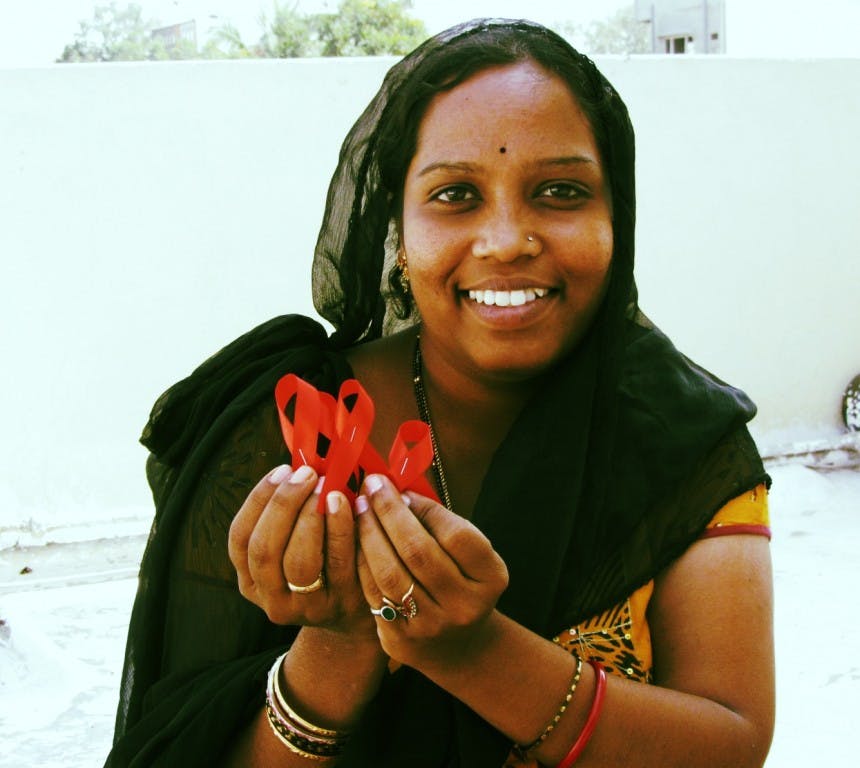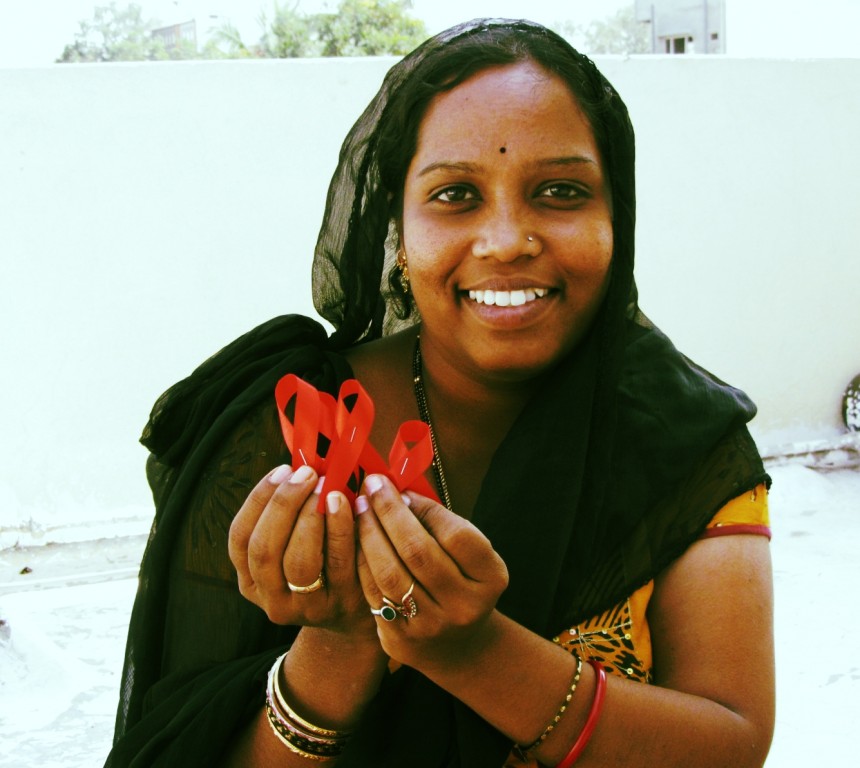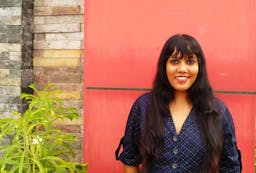In India, young women defy HIV, script a positive story
Feb 25, 2019
Story


Braving social stigma, economic hardship and ill health, hundreds of young HIV positive women in India are claiming back their rights to a life of self-reliance and dignity.
HYDERABAD: In India, there are 2.4 million people living with HIV/AIDS. Official data revealed by the Union Ministry of Health and Family Welfare shows, well over a million of these HIV-positive people are youths most of whom live in poverty with few means of earning a livelihood and a constant fear of social ostracism.
29–year old Krishna Savitha of Hyderabad – a city in the south of India – is, however, a marked difference.
A seller of red ribbons and glass bangles, Savitha barely has the time to sit and talk as customers pour into her tiny shop all day long. On some days, she does not even have time for lunch. Yet, Savitha is happy. The reason is not hard to guess: brisk business has also helped her earn well.
“I have been very busy since October. First, there were major festivals like Dasara, Diwali and Sankranthi. And right now, there is the season of weddings which goes on till the end of this week. In the past four days alone, I have made a profit of Rs 4,000 ($80). After this season is over, I will take a break. Maybe I will visit my relatives,’ says Savitha, with a smile.
Owning a business and making money of her own is like a miracle to Savitha who was married at fourteen to a man twice her age, and widowed at twenty with two toddlers. Her husband, a landless, migrant daily wager, had AIDS – a fact Savitha learned only after his death.
And then she also learned that she was infected with HIV - the virus that caused AIDS.
When she told her neighbors and relatives of this, instead of sympathizing with her, they shunned Savitha completely, fearing that she would infect them as well.
For three years, Savitha lived in utter loneliness and without hope. Many times, she thought of committing suicide.
Red Ribbon Entrepreneurs with a positive attitude
But, in 2008, a chance meeting with another young HIV positive woman called Swapna Raj changed Savitha’s life forever. Raj was the president of People Living with HIV (PLHIV) – a network of HIV positive people who help each other live with dignity and self-respect. PLHIV coordinates with local hospitals and when new cases of HIV are registered there, it meets the patients, encourages them to join the network where they can receive free counseling on health, career and above all, emotional support that can help them rebuild their lives.
When Savitha joined PLHIV, the first thing that she learned was how to make a red ribbon.
Recalls Savitha, “When I joined the network, I met many other women of my age. They told me that being HIV positive did not mean the end of the world and that I could start a business and they would help me in whichever way possible. I had no money of my own, so women from our network bought me some ribbons and pins and asked me to make red ribbons. They said that they the government, NGOs and even churches wanted these ribbons because they give message against HIV and AIDS.”
Making ribbons is a job Savitha found quite easy and in two weeks she could make as many as five thousand ribbons that were sold for INR 1 (5 cent) a piece. At the end, she made a profit of INR 3,000($60) – with which she started a small, home-based business of selling glass bangles. For first few weeks, all of her customers were from the PLHIV network.
But soon, women in her neighborhood also started to shed their fear and visit Savitha’s shop. As business slowly picked up, Savitha, started to use the opportunity to spread words about HIV/AIDS. She usually begins by gifting each of her customers a red ribbon, before discussing what causes the virus and how to deal with it. “They are more aware of HIV/AIDS now and are no longer scared of getting infected by me,” Savitha says with a smile.
24-year old Shri Latha also makes red ribbons for a living. But, unlike Savitha, Latha has made this her full time occupation. Says Latha, “when I joined the network, AIDS Day was around the corner. Someone suggested that soon there would be a demand for red ribbons and I could try stitching some. Now, I make ribbons of all colors: red ribbon is anti-HIV, pink ribbons are anti-breast cancer and purple ribbons are anti- domestic violence. I get bulk orders from different NGOs and educational institutions. I normally make seven to eight thousand rupees ($140-160) a month.”
Like Savitha and Sri Latha, several hundred young HIV positive women from PHLIV in Hyderabad and nearby districts are turning entrepreneurs to find themselves a new life of financial security and dignity.
They are partnering with the government and various local and international NGOs on many livelihood programs for HIV/AIDS patients. They are also forming self-help groups, raise INR 3-5,000 ($50-$100) to start a business, or, get trained in skills that can help earn a living: tailoring, selling flowers, fruits and vegetables, making decorative items, beads, selling bangles, running provision stores, tea kiosks, food stalls and so on.
And they also make red ribbons – something they find both financially viable and emotionally satisfying as it helps them spread awareness of HIV/AIDS.
Claiming their right to self-reliance and dignity
“The government gives us free treatment also a monthly stipend of INR 200 ($4). But nobody can support herself entirely with that money. Besides, we are young people. We have dreams. We want to live well. As we are on Anti-retroviral Therapy, we also need nutritious food. But not all of us are educated. Also, many employers think we are sick and not able-bodied. So, the logical thing to do is help us find self-employment. For women who do not have any particular skills, making red ribbons can be a start,” says Swapna Raj, founder of PLHIV who has personally trained over a hundred women in ribbon-making.
Jagadeesh Kumar, an HIV/AIDS expert says that the government has also started to support self-employment. “There is an effort to shift from ’charity mood’ to ‘self-sustainability mood,” says Kumar who partnered in a government-run health program called Balasahyoga (meaning child support) that helps young HIV positive women with children to earn a livelihood.
Kumar informs that in past five years, over ten thousand women - mostly young widows from marginalized communities - have been given training and loans to start a small business that can help them earn some profits while getting enough nutrition for herself and her children. These include growing fruits, vegetables and rearing chicken or a keeping a cow.
Guna Lakshmi is a 32 year old HIV positive woman from West Godavari – a coastal district - who had benefited from Balasahayog program. "My husband never told me he was HIV positive. But five years ago, he died and I started to get sick very often. The doctors at a local hospital told me that I had HIV virus and that my husband had also died of AIDS. But my parents-in-law threw me out of their house. They said, ‘you are going to die soon. So, just go someplace else and die,” says Lakshmi.
However, in 2010, under the Balasahyog program, Lakshmi received INR 8,000 ($160) and with that money, she bought a dairy cow. Today the number of Lakshmi’s cattle has grown to three and she is living comfortably selling milk to her neighbors and the sweet shops in the town. “I am on Anti-retroviral Therapy and I am not dead yet. Doctors say that I can live for another fifteen years. When it’s time for me to go, I will give these cows to a woman who also has nobody else.”
Young, passionate and responsible
Besides economic self-reliance, the young women of PLHIV network are also claiming their rights to companionship and remarrying, ending years of isolation and loneliness. In the network they open their hearts to each other which leads to understanding, support, and quite often, love. And when they decide to marry, it is an informed decision taken by two people who not only know each other, but also share a common passion for living.
So far, over 250 HIV positive couples in PLHIV have tied the knot in Hyderabad alone, informs Swapna Raj who also remarried in 2008 after her first husband died.
“Nobody has to die alone just for being HIV positive. At our network, we encourage all the single members to remarry. However, we also take the pledge that the virus must end with us. So, if both the partners are HIV positive, they must not have children as that would mean passing on the virus to the next generation. So, while we claim our rights, we also fulfill our responsibilities as citizens,” she says.
Written under the aegis of ComMutiny Media Network for ComMutiny - The Youth Collective, a collective of youth centric organizations advocating for democratic and self governed spaces for young people
www.facebook.com/5thSpace
www.youtube.com/user/the5thSpace
www.5thSpace.in




